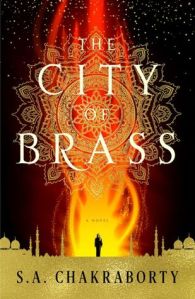Title: The City of Brass
Series: The Daevabad Trilogy #1
Author: S.A. Chakraborty
Genre: Fantasy
Trigger Warnings: Blood, death, fire, drowning, rape (mentions), racism in allegory, death of children, body horror
Back Cover:
Nahri has never believed in magic. Certainly, she has power; on the streets of 18th century Cairo, she’s a con woman of unsurpassed talent. But she knows better than anyone that the trade she uses to get by—palm readings, zars, healings—are all tricks, sleights of hand, learned skills; a means to the delightful end of swindling Ottoman nobles.
But when Nahri accidentally summons an equally sly, darkly mysterious djinn warrior to her side during one of her cons, she’s forced to accept that the magical world she thought only existed in childhood stories is real. For the warrior tells her a new tale: across hot, windswept sands teeming with creatures of fire, and rivers where the mythical marid sleep; past ruins of once-magnificent human metropolises, and mountains where the circling hawks are not what they seem, lies Daevabad, the legendary city of brass, a city to which Nahri is irrevocably bound.
In that city, behind gilded brass walls laced with enchantments, behind the six gates of the six djinn tribes, old resentments are simmering. And when Nahri decides to enter this world, she learns that true power is fierce and brutal. That magic cannot shield her from the dangerous web of court politics. That even the cleverest of schemes can have deadly consequences.
After all, there is a reason they say be careful what you wish for…
Review:
I’m struggling with what to say about this book. It was good. It wasn’t as gripping and engrossing as I’d hoped, but it was still perfectly readable. I just had a few issues, which I want to get out of the way first. (Also, fair warning: This is a really long book and this review may get long too.)
One: Dara (the djinn that Nahri accidentally summons) refuses to tell Nahri anything for no discernable reason. At one point Nahri actually has to threaten to let herself get eaten by monsters to convince him to tell her anything. I have no idea what his purpose is in keeping her in the dark about the family she’s supposedly part of and the society he wants her to join, and knowing a lot of these non-secrets would have actually been helpful. The book tries to make a romance between the two of them but it was mostly based on “he’s hot” and it felt forced to me. He seemed irritatingly tropey at the beginning and I only tolerated him because Nahri liked him a lot, but I outright hated him at the end.
Two: There’s a lot of politicking in this book, but the essential conflict is Nahri, a con woman used to deciding her own fate and scheming for her coin, being stripped of any agency over her own life by people who have decided that her family heritage and what they think that means for her take precedence over anything she might want, say, think, or feel. It wasn’t bad from a story point of view, but it was a case where I got so frustrated with Nahri being unable to wrest any agency away from these people that I almost put it down from sheer rage.
Despite how annoyed I got with politicking in Dune, I didn’t mind it that much in this book. Well, I did a bit in the beginning, but as I grew to like the characters more I minded it less. Which is a good thing, because despite some magic, some fights, and one assassin, the majority of the book is politics. The plot consists of a blend of Daevabad politics and Nahri fighting for some agency, so if you can’t tolerate the politics at least a little you won’t like this book. But on the bright side, they’re magic politics about djinn, so slightly less boring than regular politics.
Ali, a djinn prince in Daevabad, is a point-of-view character, and at first he bored me to death. Compared with Nahri and her magic and adventures, the palace niceties and politics in his sections were pretty bland. He also started out as a wide-eyed innocent kid taking his first steps into adult responsibilities, and that was a little grating, but he got wise pretty quick and I liked him and Nahri about equally by about halfway through. I enjoyed their friendship a lot, actually, and I hope it continues in the rest of the series.
I love how steeped this story is in Arabic culture. Unlike the author, I’m not a convert to Islam, but between my research into Islam and my studies of the Arabic language I understood all of the terms mentioned and could even spell most of them, which made me feel pretty proud of myself. Plus (as you might have guessed by the fact that I’ve studied Islam despite not being Muslim and am teaching myself Arabic) Middle Eastern and especially Islamic culture is fascinating to me, and I love worlds set there – even though this story mostly took place in the fictional djinn city of Daevabad as opposed to a real-world setting, it was still unquestionably an Arabic world.
Up until the very end, I was on the fence about whether I’d continue reading the series. It wasn’t a bad read, it just didn’t grip me as much as I would have liked. But I really like the world, I can’t wait until Nahri finally snaps and unleashes hell on these people, and the ending picked up steam and left me with enough unanswered questions to be interested in continuing. If nothing else, my library has the rest of the series on audiobook too, so they’ll at least be reasonably interesting work reading.
The Daevabad Trilogy:
- The City of Brass
- The Kingdom of Copper
- The Empire of Gold

